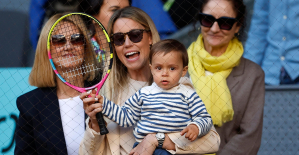This was after Russia's invasion and subsequent rise in food and energy prices.
Ramadan is a time when families gather for meals and celebrate with their loved ones. Many people in Indonesia, a Southeast Asian nation, planned to observe Ramadan on Sunday. Shiites from Iran, Iraq, and Lebanon also observed Ramadan one day later.
Muslims use a lunar calendar. Different countries may declare Ramadan starting on a different day depending on how they view the moon.
The United Arab Emirates, Egypt, Syria and Saudi Arabia are all Muslim-majority countries. They declared that the month will begin on Saturday morning.
Friday's Saudi statement was broadcast on state-run Saudi TV. Sheikh Mohammed bin Zayed Al Nahyan (the crown prince of Abu Dhabi, and de facto leader in the United Arab Emirates), congratulated Muslims for Ramadan's arrival.
Jordan, a Sunni country and a major contributor to the Islamic religion, said that Ramadan's first day would fall on Sunday. This is a departure from Saudi Arabia. According to the kingdom, the Islamic religious authority could not spot the crescent moon that indicated the start of the month.
Muhammadiyah, Indonesia's second largest Islamic group, announced that Ramadan began Saturday according to its astronomical calculations. After Islamic astronomers failed to see the new moon, the country's religious affairs minister announced that Ramadan would begin on Sunday.
Although the Muhammadiyah did not offer a different opinion, most Indonesians, which include nearly 90% of its 270 million inhabitants, are expected to adhere to the government's official date.
Many had hoped for more joyous Ramadan following the two-year-long coronavirus pandemic that prevented 2 billion Muslims around the world from participating in many religious rituals.
Millions of Middle East residents are now worried about where their next meal will come from after Russia invaded Ukraine. People whose lives have been ruined by war, displacement, and poverty in Syria, Iraq, Lebanon, and Sudan to name a few are now suffering from the rising prices.
Ukraine and Russia account respectively for one third and two thirds of the world's wheat and barley exports. This is vital for Middle East countries as they rely on them to provide food for millions of people who eat subsidized bread or bargain noodles. They are also the top exporters of sunflower seed oil and other grains used in cooking.
In recent years, Egypt has received the majority of its wheat from Russia, Ukraine, and other countries. The currency has also fallen, which adds to the pressures that have driven up prices.
This week, shoppers in Cairo went out to get groceries and decorations. However, many were forced to spend less this year due to the high prices.
Ramadan tradition calls to colorful lanterns and lights strung through Cairo's narrow alleyways and around mosques. People who have the resources to set up tables in the streets for poor people to serve free Iftar meals. This practice is called "Tables of the Compassionate" in the Islamic world.
Rabei Hassan (the muezzin of Giza's mosque) said that this could be a solution to the situation. He bought vegetables from a nearby marketplace and also other food items. People are sick of the high prices."
After being banned from attending mosques for two years, worshippers flocked to al-Azhar mosque in order to end the pandemic.
"They were difficult (times)... Ramadan without tarawih in the mosque is not Ramadan," stated Saeed Abdel-Rahman, a retired teacher of 64 years as he entered al-Azhar to pray.
The economic woes of Lebanese, already in a severe economic crisis, were exacerbated by the soaring prices. The country's middle classes were plunged into poverty over the past two-years after the currency crashed. A severe shortage of electricity, fuel, and medicine has resulted from the meltdown.
Few people were out shopping in Gaza Strip's Friday markets, which are usually packed this time of the year. According to merchants, Russia's war against Ukraine has caused prices to skyrocket, along with the usual challenges. This is putting a damper in the festive atmosphere Ramadan creates.
The conditions for the 2.3 million Palestinians living in the coastal area are difficult. This is compounded by the crippling Israeli-Egyptian Blockade that has been in place since 2007.
A deadly 11-day war between Israel and Gaza's Hamas rulers erupted at the end Ramadan 2013. It shook the festive season, including Eid al-Fitr, which follows the holy month. This was the fourth bloody war with Israel in a little over a decade.
The start of Ramadan in Iraq highlighted widespread dissatisfaction over the rapid rise in food prices. This was made worse by the conflict in Ukraine.
Suhaila, a retired teacher and women's rights activist aged 62, stated that she and her husband struggle to live on their joint pension of $1,000 per month. The prices of food, flour, and other essentials have more than doubled.
"We use flour and cooking oil a lot as Iraqis. Nearly every meal is prepared with cooking oil and flour. She asked, "How can a family with five members survive?"
Akeel Sbah, 38, works as a distributor of flour in the Jamila wholesale marketplace. This market supplies Baghdad's Rasafa District on the eastern side the Tigris River. He explained that flour and most other food items are imported so distributors must pay in dollars. A ton of flour was once $390. He said, "Today I purchased the ton for $625."
"The currency devaluation of a year ago already caused an increase in prices. But with the ongoing (Ukraine), crisis, prices have soared. He said that distributors lost millions.
Istanbul saw Muslims hold the first Ramadan prayers for 88 years in Hagia Sophia. This was almost two years after the famous cathedral was converted to a mosque.
Friday night, worshippers filled the building from the 6th century and the square to hear Ali Erbas's tarawih prayers. The Grand Hagia Sophia Mosque was renamed to Islamic use in July 2020. However, COVID-19 restrictions have limited worship at this site.
According to the state-run Anadolu Agency, Erbas stated that the Hagia Sophia Mosque had regained tarawih after 88 years of seperation.

 Hamas-Israel war: US begins construction of pier in Gaza
Hamas-Israel war: US begins construction of pier in Gaza Israel prepares to attack Rafah
Israel prepares to attack Rafah Indifference in European capitals, after Emmanuel Macron's speech at the Sorbonne
Indifference in European capitals, after Emmanuel Macron's speech at the Sorbonne Spain: what is Manos Limpias, the pseudo-union which denounced the wife of Pedro Sánchez?
Spain: what is Manos Limpias, the pseudo-union which denounced the wife of Pedro Sánchez? Spain is the country in the European Union with the most overqualified workers for their jobs
Spain is the country in the European Union with the most overqualified workers for their jobs Parvovirus alert, the “fifth disease” of children which has already caused the death of five babies in 2024
Parvovirus alert, the “fifth disease” of children which has already caused the death of five babies in 2024 Colorectal cancer: what to watch out for in those under 50
Colorectal cancer: what to watch out for in those under 50 H5N1 virus: traces detected in pasteurized milk in the United States
H5N1 virus: traces detected in pasteurized milk in the United States Private clinics announce a strike with “total suspension” of their activities, including emergencies, from June 3 to 5
Private clinics announce a strike with “total suspension” of their activities, including emergencies, from June 3 to 5 The Lagardère group wants to accentuate “synergies” with Vivendi, its new owner
The Lagardère group wants to accentuate “synergies” with Vivendi, its new owner The iconic tennis video game “Top Spin” returns after 13 years of absence
The iconic tennis video game “Top Spin” returns after 13 years of absence Three Stellantis automobile factories shut down due to supplier strike
Three Stellantis automobile factories shut down due to supplier strike A pre-Roman necropolis discovered in Italy during archaeological excavations
A pre-Roman necropolis discovered in Italy during archaeological excavations Searches in Guadeloupe for an investigation into the memorial dedicated to the history of slavery
Searches in Guadeloupe for an investigation into the memorial dedicated to the history of slavery Aya Nakamura in Olympic form a few hours before the Flames ceremony
Aya Nakamura in Olympic form a few hours before the Flames ceremony Psychiatrist Raphaël Gaillard elected to the French Academy
Psychiatrist Raphaël Gaillard elected to the French Academy Skoda Kodiaq 2024: a 'beast' plug-in hybrid SUV
Skoda Kodiaq 2024: a 'beast' plug-in hybrid SUV Tesla launches a new Model Y with 600 km of autonomy at a "more accessible price"
Tesla launches a new Model Y with 600 km of autonomy at a "more accessible price" The 10 best-selling cars in March 2024 in Spain: sales fall due to Easter
The 10 best-selling cars in March 2024 in Spain: sales fall due to Easter A private jet company buys more than 100 flying cars
A private jet company buys more than 100 flying cars This is how housing prices have changed in Spain in the last decade
This is how housing prices have changed in Spain in the last decade The home mortgage firm drops 10% in January and interest soars to 3.46%
The home mortgage firm drops 10% in January and interest soars to 3.46% The jewel of the Rocío de Nagüeles urbanization: a dream villa in Marbella
The jewel of the Rocío de Nagüeles urbanization: a dream villa in Marbella Rental prices grow by 7.3% in February: where does it go up and where does it go down?
Rental prices grow by 7.3% in February: where does it go up and where does it go down? Even on a mission for NATO, the Charles-de-Gaulle remains under French control, Lecornu responds to Mélenchon
Even on a mission for NATO, the Charles-de-Gaulle remains under French control, Lecornu responds to Mélenchon “Deadly Europe”, “economic decline”, immigration… What to remember from Emmanuel Macron’s speech at the Sorbonne
“Deadly Europe”, “economic decline”, immigration… What to remember from Emmanuel Macron’s speech at the Sorbonne Sale of Biogaran: The Republicans write to Emmanuel Macron
Sale of Biogaran: The Republicans write to Emmanuel Macron Europeans: “All those who claim that we don’t need Europe are liars”, criticizes Bayrou
Europeans: “All those who claim that we don’t need Europe are liars”, criticizes Bayrou These French cities that will boycott the World Cup in Qatar
These French cities that will boycott the World Cup in Qatar Football: after a cascade of injuries, a Laval player takes Pfizer and BioNTech to court
Football: after a cascade of injuries, a Laval player takes Pfizer and BioNTech to court Tennis: in pictures, Nadal's baby attends his dad's victory in Madrid
Tennis: in pictures, Nadal's baby attends his dad's victory in Madrid NBA: Lakers on the verge of elimination, Embiid scores 50 points for the Sixers
NBA: Lakers on the verge of elimination, Embiid scores 50 points for the Sixers Judo: Blandine Pont European vice-champion
Judo: Blandine Pont European vice-champion


















